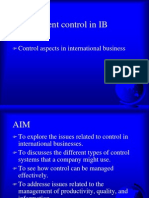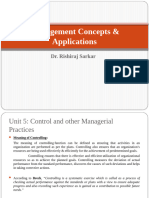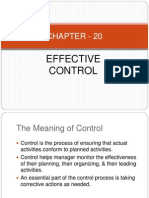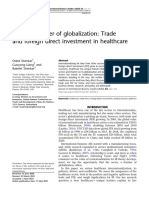Management Control Systems
Uploaded by
mohit462Management Control Systems
Uploaded by
mohit462Management Control Systems ICFAI UNIVERSITY
A control system is a set of formal and informal systems to assist the management in steering the organization towards its goals. Controls help in guiding employees effectively towards the accomplishment of the organizations goals. Establishing a control system in an environment of distributed accountability, reengineered processes, and local autonomy and empowerment is a challenging task. The control process in any organization can be undertaken at three levels. These are: the strategic level, the management level, and the operational level. Each type of control occurs primarily at one of the three distinct levels of the organizational hierarchy. Strategic control deals primarily with the broad questions of domain definition, direction setting, expression of the organizations purpose, and other issues that impact the organization's long-term survival. Strategic control overlaps to some extent with the process of strategy formulation. Strategic control also deals with issues relating to general company objectives and the implementation and monitoring of progress. Management control deals with effective resource utilization, the state of competitiveness of the unit, and the translation of corporate goals into business unit objectives. Operational control is primarily concerned with efficiency issues. Occurring at very specific functional or sub-departmental levels of the organizational hierarchy, this mode of control generally conforms to traditional control models. The time horizon of control is very short, the benchmarks are known and well defined, and the outcomes are tangible and easily measurable.
Elements of a Control System
Any control system has four important elements. They are a detector or sensor, an assessor, an effector and a communications network. The detector analyzes the situation that is being controlled. An assessor helps in comparing the actual results with the standard or expected results. An effector is used to reduce the gap between the actual and the standard result. The communication network transmits information between the detector, the assessor and the effector. The process of control usually involves four important steps. They are: Identifying the goals or objectives, Implementing the programs or policies, Measuring and comparing outcomes against targets, and Analyzing whether the achieved targets are in accordance with the goals or objectives.
Management control systems involve a number of activities in an organization, including:
Planning the future course of action Coordinating and communicating the various activities of the organization to different departments Evaluating information and deciding the various activities; and finally, Influencing people to work in accordance with the goals of the organization.
Management Control Process
The management control process involves three interrelated activities communication, motivation and evaluation. First, it involves communication between the superior and the subordinates. Communication helps the subordinates understand the goals of the organization. The superior should make sure that the subordinates understand what the organization expects of them. Second, for the subordinates to put in their best efforts to achieve organizational goals, they have to be motivated. It is the responsibility of the superior to motivate the subordinates. Finally, for effective performance, superiors should evaluate the work of the subordinates and give them feedback periodically. It is essential for the superior to evaluate the performance of subordinates without any bias.
Characteristics of a Good Management Control System
A good management control system ensures success for an organization. Good management control here implies that the goals of the organization are clearly communicated to the employees, and that the employee is confident about performing his tasks well. For example, good inventory control means that employees have information about the quantity of inventory present and its availability at different locations. An organization does not usually have perfect control. For perfect control all the employees should be working in the best possible way. But this is not always possible as employee behavior is not stable. Good control can be achieved in the following ways: Future-oriented Planning is always oriented to the future. The organization should be focused on the future. Employees should be encouraged to be flexible so as to respond effectively to change. Clear Objective Good control cannot be established unless the multiple objectives of a particular task are considered separately. For example, to assess the control system relating to production, all major performance parameters like efficiency, quality and asset management, have to be measured. Minimum control losses Control devices are costly and not always economically feasible. So, control devices should be put in place only when the economic benefits exceed the costs. The difference between the performance that is theoretically possible and one that can be reasonably expected is called control loss. An organization achieves optimal performance when control losses are minimized.
In the last few decades, companies have grown across borders at a tremendous pace. This growth in business has made it imperative for managers to increase their awareness in relation to the important issues involved in cross-border investments, subsidiary control, global benchmarking practices and cultural diversities of countries. Multinational Corporations (MNCs) have to adapt various control practices used in their home countries (headquarters) to suit the requirements of the host countries (subsidiaries). Improper adaptation of control systems used in the home country for subsidiaries, works against the interests of the organization. As control is one of the most important issues for an MNC, we will discuss the ways and means by which the headquarters exercises control over its subsidiaries.
TYPES OF CONTROLS USED BY MNCs
MNCs use different types of controls to monitor and improve the performance of their subsidiaries. Some of the controls are: Personal controls Output controls Cultural controls Result controls Bureaucratic controls
Personal Controls
Personal control is exercised through informal meetings that take place at all levels between the officials of the headquarters and the subsidiary. These meetings help them to establish greater coordination and communication between the headquarters and the subsidiary.
Output Controls
Output control relates to the performance of a subsidiary in quantitative and qualitative terms. Performance measures can be established to determine profitability, productivity, quality of the product and market share of a subsidiary. The headquarters often set stiff targets for the subsidiaries especially in terms of profitability and productivity. These targets act as controls for the subsidiary.
Cultural Controls
Cultural controls are exercised by an MNC directly or indirectly in order to uphold, manage and improve the work culture in its subsidiaries. These controls help in regulating the behavior of employees at the subsidiary.
Result Controls
Controls that are used for rewarding individuals or groups for generating good results are called result controls. One of the best examples of result control is the pay for performance system used in the US. In this system, employees are paid on the basis of their performance rather than the number of hours they have worked. A similar system is often used in MNC subsidiaries in order to control performance.
Bureaucratic Controls
Bureaucratic controls take the form of rules, norms and regulations imposed
by the headquarters on the subsidiaries so that the business is conducted properly. For example, a company may have rule that restricts subsidiaries from spending more than 10% of their allocated budget on business-related travel.
CONCEPT OF STRATEGIC CONTROL
Strategic control is defined by Prahlad and Doz as the extent of influence that a head office has over a subsidiary concerning decisions that affect subsidiary strategy. In many multi-business, multinational companies, more than 50% of the assets, sales and profits come from overseas operations. As MNCs grow and as their operations become more complex, the headquarters has to devise and implement strategies to control subsidiaries effectively. However, the controls should not hamper the growth of the subsidiaries. Some of the factors that determine the kind of influence the headquarters has over the subsidiary are:
Headquarters-Subsidiary Environment
Earlier, MNCs used to invest and consolidate their position only in their home countries. But with better growth prospects in foreign markets compared to the domestic markets, MNCs have started to invest and create a stronger asset base for their foreign subsidiaries too. For this reason, the headquarters of a company has to exercise greater strategic control over its subsidiaries.
Impact of Global Competition
Over the last few decades, competition between players in a wide range of industries has intensified. Industries like automobiles, chemicals, and consumer electronics have experienced intense competition. In order to compete in the global market, an MNC should surpass the boundaries of national markets and prepare a global strategy. In order to do so, it has to constantly review and change its sourcing patterns, pricing strategies, product designs, etc. This has led the headquarters of MNCs to exercise greater control over their subsidiaries.
Impact of Host Government Demands
Often, the host government (i.e. the government of the country in which the subsidiary of the MNC operates) intervenes in the operations of an MNC. Host governments are averse to centralization and may penalize the MNC for excessive controls. Hence, MNCs find themselves in a tricky situation where on the one hand, the government demands greater autonomy for the subsidiaries, and on the other hand, the government itself intervenes in their functioning. Strategic control by the headquarters has gained importance for this reason.
Impact of Joint Ventures
In order to gain entry into certain foreign markets, an MNC may form a joint venture with a local company because the host government restricts the direct entry of MNCs. In recent years, many joint ventures have not proved successful in the long term because of lack of coordination and conflicting interests between the MNC and the local company. Due to lack of coordination and communication between the MNC and the local company, the subsidiary cannot operate properly. The MNC cannot exercise excessive control because it fears that the joint venture may be called off and it may be
deprived of a prospective market. Here, established control systems for the subsidiary are useful.
FACTORS AFFECTING CONTROL SYSTEMS IN MNCs
MNCs need to adapt the control systems practices prevalent in their home country to the conditions prevalent in the foreign country. These control systems should be evaluated on a continuous basis and should be modified when required. Control systems need modification or changes because they are affected by a number of factors such as: Cultural Differences Across Countries Differences in Business Environment
Cultural Differences Across Countries
Culture and traditions vary from country to country. MNCs need to be sensitive to these differences when designing control systems for their subsidiaries. Culture has a great effect on management control systems (MCSs) because a number of control problems are in fact behavioral problems. A number of studies have been conducted to study the implications of various aspects of culture for MCSs. Geert Hofstede, in his landmark study, identified four types of cultural dimensions, which have distinct implications for control systems. According to Hofstede, the four cultural dimensions are: Individualism Power distance Uncertainty avoidance Masculinity Individualism Individualism is a cultural dimension, which determines how an individual sees himself, i.e. as an individual entity or as a part of a larger group. Cultures that are highly individualistic consist of people who give priority to their selfinterest rather than that of the group. When the culture is collectivist, people give more importance to the group interest rather than the individuals interest. This dimension of culture is important for designing the reward system in an organization- an integral part of MCSs. For example if the culture is highly individualistic, organizations use individual incentives for motivating their employees. If the culture is collectivist, it gives incentives based on group performance. Power distance In an organization different people are vested with different degrees of power and authority. This often creates a feeling of inequality. Power distance means the extent to which employees understand and accept this unequal distribution of power. In the context of MCSs, employees who score high on power distance always prefer centralization and do not like to delegate authority. Employees who score low on power distance prefer greater decentralization and participation. Uncertainty avoidance Uncertainty avoidance is a cultural dimension seen in employees who avoid taking risks. Employees who favor uncertainty avoidance, do not take quick decisions and feel uncomfortable when confronted with difficult situations. If an organization has a large number of employees who are averse to risk taking, then it must have clear rules and guidelines for every action. It has to do things in a planned and systematic manner so that employees know beforehand what they have to do in unfamiliar situations. Masculinity
Masculinity is defined here as a strong drive for achievement. Employees with this attribute are highly assertive and are often entrusted with responsible roles. They take decisions quickly and are not worried about the results. The implication for MCSs is that such employees demand more autonomy and freedom at the workplace. They do not like excessive controls and cannot perform well in a highly centralized organization. They also prefer performance-based rewards.
Differences in Business Environment
Business environment is dynamic and differs across countries. Organizations need to learn to adapt to these changes in environment in order to survive and prosper. Some of the elements of business environment that have an effect on control systems are: Inflation Business risk and uncertainty Labor availability and quality Inflation Inflation refers to a sustained increase in the general price level in an economy. As the rate of inflation increases, the value and purchasing power of money decreases. Rates of inflation vary widely across countries. MNCs need to evaluate the impending financial risk due to fluctuations in inflation rates. An MNC operating in a country which has a high rate of inflation, may experience an erosion in the value of its assets. High inflation can also adversely affect the compensation of employees. As the prices of goods increase, there should be a corresponding increase in salaries. This would in turn mean that the management has to make changes in its rewards system -an integral part of the control system.P Business risk and uncertainty MNCs operating in different countries are exposed to different types of risks and uncertainty. Business risk and uncertainty is lower in countries which are economically and politically stable than in countries which are politically and economically unstable. Risk also differs across countries depending on the extent of economic development. Companies in economically underdeveloped countries may not have strong and well-developed control systems. A poor and undeveloped MCS is characterized by a poor accounting system, an ineffective information system, limited computerization and excessively subjective performance reviews. A companys growth strategy also affects the way an organization manages risk. Companies may grow organically (i.e. gradual growth due to increase in profit or returns) or by acquiring other firms. When companies grow by acquiring other firms, they encounter variations in control systems. A company that can adopt the best control system for all its acquisitions will be more adept at managing risks. Labor availability and quality MNCs operating in underdeveloped countries find it difficult to hire skilled labor due to the lack of quality education and vocational training. This forces the management to have a highly centralized structure and to exercise a high degree of control. Even at the managerial level, there is a marked difference in the quality of managers across the countries. An MNC needs to consider all these factors before designing the control systems for its subsidiaries.rinciples
You might also like
- The Process Flowchart at Arnold Palmer Hospital100% (1)The Process Flowchart at Arnold Palmer Hospital3 pages
- Reviews in Different Controlling Mechanics: Types of Control MechanismsNo ratings yetReviews in Different Controlling Mechanics: Types of Control Mechanisms26 pages
- Control Over Policies: The Need of Control Over Policies Is Self-Evident. in Many Enterprises, TheNo ratings yetControl Over Policies: The Need of Control Over Policies Is Self-Evident. in Many Enterprises, The9 pages
- Give An Overview On Management Control System and Its Importance in Different Organizations With Examples?No ratings yetGive An Overview On Management Control System and Its Importance in Different Organizations With Examples?4 pages
- Checking Progress (Group 2 - Mt. Dulang-Dulang) O.MNo ratings yetChecking Progress (Group 2 - Mt. Dulang-Dulang) O.M21 pages
- Chapter 6 & 7 Business Cntrol and EthicsNo ratings yetChapter 6 & 7 Business Cntrol and Ethics26 pages
- Controlling, Management Principle and Organisational Behavior, MpobNo ratings yetControlling, Management Principle and Organisational Behavior, Mpob35 pages
- Chemical and Food Engineering DepartmentNo ratings yetChemical and Food Engineering Department6 pages
- Controlling Organization: Predetermined Standards, Attempts To Take Corrective MeasuresNo ratings yetControlling Organization: Predetermined Standards, Attempts To Take Corrective Measures11 pages
- Chemical and Food Engineering DepartmentNo ratings yetChemical and Food Engineering Department6 pages
- Managerial and Quality Control: Chapter SummaryNo ratings yetManagerial and Quality Control: Chapter Summary14 pages
- The Process of Designing A Good Management Control SystemNo ratings yetThe Process of Designing A Good Management Control System4 pages
- Information and Database Quality Information and Database QualityNo ratings yetInformation and Database Quality Information and Database Quality239 pages
- M.A. Psychology First Year Practical File MPCL-00750% (2)M.A. Psychology First Year Practical File MPCL-00754 pages
- Indications of An Ineffective Organizational StructureNo ratings yetIndications of An Ineffective Organizational Structure2 pages
- Z@@Shenkar2022 Article TheLastFrontierOfGlobalizationNo ratings yetZ@@Shenkar2022 Article TheLastFrontierOfGlobalization13 pages
- Unless Otherwise Specified, All Monetary Values Are in Millions of INRNo ratings yetUnless Otherwise Specified, All Monetary Values Are in Millions of INR7 pages
- Workbook - Communicating With Tact and Finesse100% (1)Workbook - Communicating With Tact and Finesse11 pages
- (Ebook) Dark Goddess Craft: A Journey Through the Heart of Transformation by Woodfield, Stephanie ISBN 9780738752563, 9780738754079, 0738752568, 0738754072 all chapter instant downloadNo ratings yet(Ebook) Dark Goddess Craft: A Journey Through the Heart of Transformation by Woodfield, Stephanie ISBN 9780738752563, 9780738754079, 0738752568, 0738754072 all chapter instant download65 pages
- Dying A Social Perspective On The End of Life Alex Broom Download PDF100% (8)Dying A Social Perspective On The End of Life Alex Broom Download PDF65 pages
- Reviews in Different Controlling Mechanics: Types of Control MechanismsReviews in Different Controlling Mechanics: Types of Control Mechanisms
- Control Over Policies: The Need of Control Over Policies Is Self-Evident. in Many Enterprises, TheControl Over Policies: The Need of Control Over Policies Is Self-Evident. in Many Enterprises, The
- Give An Overview On Management Control System and Its Importance in Different Organizations With Examples?Give An Overview On Management Control System and Its Importance in Different Organizations With Examples?
- Checking Progress (Group 2 - Mt. Dulang-Dulang) O.MChecking Progress (Group 2 - Mt. Dulang-Dulang) O.M
- Controlling, Management Principle and Organisational Behavior, MpobControlling, Management Principle and Organisational Behavior, Mpob
- Controlling Organization: Predetermined Standards, Attempts To Take Corrective MeasuresControlling Organization: Predetermined Standards, Attempts To Take Corrective Measures
- The Process of Designing A Good Management Control SystemThe Process of Designing A Good Management Control System
- The Balanced Scorecard: Turn your data into a roadmap to successFrom EverandThe Balanced Scorecard: Turn your data into a roadmap to success
- Information and Database Quality Information and Database QualityInformation and Database Quality Information and Database Quality
- M.A. Psychology First Year Practical File MPCL-007M.A. Psychology First Year Practical File MPCL-007
- Indications of An Ineffective Organizational StructureIndications of An Ineffective Organizational Structure
- Z@@Shenkar2022 Article TheLastFrontierOfGlobalizationZ@@Shenkar2022 Article TheLastFrontierOfGlobalization
- Unless Otherwise Specified, All Monetary Values Are in Millions of INRUnless Otherwise Specified, All Monetary Values Are in Millions of INR
- (Ebook) Dark Goddess Craft: A Journey Through the Heart of Transformation by Woodfield, Stephanie ISBN 9780738752563, 9780738754079, 0738752568, 0738754072 all chapter instant download(Ebook) Dark Goddess Craft: A Journey Through the Heart of Transformation by Woodfield, Stephanie ISBN 9780738752563, 9780738754079, 0738752568, 0738754072 all chapter instant download
- Dying A Social Perspective On The End of Life Alex Broom Download PDFDying A Social Perspective On The End of Life Alex Broom Download PDF

























































































